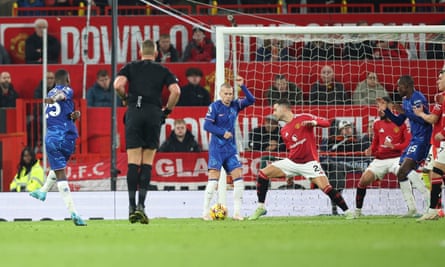Well, something definitely happened there. But what exactly? There is an affectionate joke about good, punchy Australian sports writing, which basically involves saying Here’s The Thing, right, then spelling out exactly what The Thing is in 800 brutally frank words, pounding The Thing into submission, shaking hands with The Thing, then, ideally, going off for a quick drink with The Thing.
What was the thing here? Trapped energy. Drift. Ennui. A good goal by Moisés Caicedo. The death-football of late-stage capitalism. Casemiro lying down a lot, often to surprisingly good defensive effect.
Manchester United and Chelsea did at least produce something recognisable in the course of this 1-1 draw, specifically a game of two halves, one of them muddled and almost surreally tedious; the other muddled and blessed with a 10-minute spell where things actually happened.
The first half in particular was an extraordinary spectacle simply for its listlessness. It started quite well. Old Trafford always has that Christmassy feeling at kick‑off. Whatever the surrounding weather there is always energy in the ground for the team, and early on there was a familiar sense of will pushing down from the stands. Around here Manchester United is still a 10‑storey love song.
At which point: nothing happened. It is hard to remember a more meandering half of elite football, the same sense of time being killed pointlessly. Football is a sport made up of dull and forgettable games. Boredom is key part of the sport and an element of its beauty. Even Jorge Valdano’s “shit on a stick” description of English football was kind of a compliment. These people will cheer anything as long as it has energy. For a long time English football berated itself for having energy without craft, too much drive, too much desire.
What was this in that context? Light and heat without content. Football as something empty and frictionless, humans in coloured shirts waiting for life to happen, JG Ballard-ball. At one point there was a three‑minute build-up to a Bruno Fernandes free-kick that was punted into the nearest part of the wall and you felt grateful for the howls and frustration, because, well, it’s just good to feel something.
Cole Palmer flickered at the edges. Caicedo and Roméo Lavia controlled the centre of the pitch. Lavia is a really good midfielder, taking the ball in any space, angling his body always to go forward, fearless in his energy. Although by the end the main function of Chelsea’s competent central pivot was to demonstrate how evident it is Casemiro really has no place at this level. This was like watching a middle-aged man trying to play tennis with someone 20 years younger. At one point Casemiro won the ball with a dramatic full‑body challenge, to huge cheers, but even this was one of these oh-blimey moments, like the ageing fast bowler’s doomed dive at mid-on, the sole purpose of which is not to have to turn and chase the ball to the boundary.
Moisés Caicedo’s equaliser was the highlight of the match. Photograph: Adam Vaughan/EPAUnited began to stir in the second half. Wesley Fofana got lost for the opening goal. Robert Sánchez slapped a hand down on Rasmus Højlund’s boot as he eased past. Fernandes buried the penalty. It was nice to see Ruud van Nistelrooy leaping and punching the air in his roll neck and overcoat. Van Nistelrooy has no obvious part in United’s future. The summer move, on a promise of extended Ten Hag time, has been a disaster for his own career path. This was a good moment for him.
Caicedo equalised on 74 minutes, a lovely volleyed finish that was only improved by the sight of Enzo Maresca, still furious about his team going behind, weirdly half-celebrating on the touchline with a face that still suggested someone had just pranged his Skoda Superb at a mini‑roundabout.
And that was pretty much that, barring some static towards the end, noise and fury without edge. The final score seemed fitting. A point takes Chelsea back into fourth spot. On the other hand they might also expect to beat the 13th best team in the country.
skip past newsletter promotionSign up to Football Daily
Kick off your evenings with the Guardian's take on the world of football
after newsletter promotion
The keynote will remain the basic oddity of the occasion. This was in outline a meeting of two forms of US ownership, successful vampirism versus a mania of unsustainable overspend. Chelsea’s 11 featured nine players signed in the current age of wow‑ball for a combined half a billion or so. United’s was the usual collection of random footballers, half‑thought ideas, fill-ins, hook-ups, Mr Wrongs.
What will happen now to these carry-overs, all those big contract players that seem to have been at the club for decades, handed down from regime to regime like a cracked china tea service? Little wonder this team has no pattern. Here United had a player on the bench just called “Amass”. Next week: an idea. A thought. A seat.
For now the wheels keep turning, the content machine continues to churn. What is being sold here exactly? A middling team in red shirts. Brand recognition, aura, free‑floating energy. A point from a draw is at least a gift to the new manager as United wait in standby mode for the next leap forward; a club that have never been quite so obviously in need of A Thing.
∎
